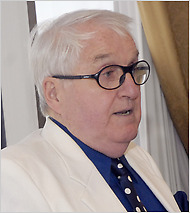Duane Clarridge
( spook, deep politician?) | |
|---|---|
 Duane Claridge pictured in 2010. Photo-credit, New York Times | |
| Born | 1932-04-16 Nashua, New Hampshire |
| Died | 2016-04-09 (Age 83) Leesburg, Virginia |
| Nationality | American |
| Alma mater | Brown University |
| Parents | Duane Herbert Clarridge Alice Scott Ramsdale |
| Interest of | Joe Fernandez |
Duane Ramsdell "Dewey" Clarridge, was an operations officer for the CIA and supervisor for more than 30 years, who became known in the mid-1980s for his role in the Contra end of the Iran-Contra Affair. He is the reputed planner of the clandestine mining of Nicaragua's harbors during the Nicaraguan Revolution.[1][2] Clarridge was the founding director of the CIA Counterterrorist Center.
Contents
Career
Clarridge was born in New Hampshire in 1932 and joined the CIA in 1955 after finishing a graduate program at Columbia's Graduate School of International Affairs. He then rose through the ranks of the CIA in "a normal career pattern up to the late 70s", (as quoted in an interview he gave to CNN's Cold War Episodes program), being chief of the CIA station in Istanbul, where he maintained close contacts with the Counter-Guerrilla, the Turkish stay-behind anti-communist organization. He transferred to Rome before becoming chief of the Latin America division in 1981.
During his three year tenure, he directed several of the CIA's more notorious operations in Latin America, including the 1984 mining of Nicaraguan harbors, an act for which the United States was condemned in the 1986 World Court at the Hague. When asked about his role in the mining, Clarridge was open about his involvement but downplayed the severity of the covert operation:
"So we decided to go big time for the economics alright... So I was sitting at home one night, frankly having a glass of gin, and I said you know the mines has gotta be the solution. I knew we had 'em, we'd made 'em outta sewer pipe and we had the good fusing system on them and we were ready. And you know they wouldn't really hurt anybody because they just weren't that big a mine, alright? Yeah, with luck, bad luck we might hurt somebody, but pretty hard you know?"
Clarridge was also instrumental in organizing and recruiting Contra forces to overthrow Nicaragua's leftist Sandinista government. He described the early Contra force as:
"about 500... some of them were former members of the Nicaraguan National Guard (whose leader Anastasio Somoza Debayle had been overthrown by the Sandinistas in 1979), or a lot of them were just you know peasants from the mountainous areas between Honduras and Nicaragua who had been at war with somebody, forever. And in many respects they were like a bunch of cattle rustlers. Bandits. Not bandits, they weren't robbing people but they were doing the things they do in that area."
But, Clarridge maintained, by the end of the conflict, the Contras numbered more than 20,000 peasants due less to the CIA's efforts than to the Sandinistas' attempts at reeducation and land redistribution.
In 1984 he became chief of the European Division of the CIA, where he ran a "counterterrorist" operation. Later, with the support of CIA director William Casey, he set up a Counterterrorist Center that operated out of CIA HQ at Langley, Virginia.
Iran-Contra
John Pilger interviews Duane Clarridge.
Excerpts from "The War on Democracy"
Bitchute backup
Clarridge claimed he had no involvement in the later illegal diversion of funds to the Contras or the subsequent cover-up. However, he was indicted in November 1991 on seven counts of perjury and false statements. On Christmas Eve 1992 in the waning hours of his presidency, George H. W. Bush pardoned Clarridge before his trial could finish. At the same time, Bush pardoned five of Clarridge's associates in the Iran-Contra Affair including former Defense Secretary Caspar Weinberger, Elliott Abrams, a former assistant secretary of state for Inter-American affairs; former National Security Advisor Robert McFarlane; former CIA employees Alan Fiers and Clair George.
Pollard case
Clarridge, then in charge of clandestine operations in Europe, recalled that the CIA director had told him that the Pollard material "goes beyond just the receipt in Israel of this stuff." But Casey, who had many close ties to the Israeli intelligence community, hadn't told Clarridge how he knew what he knew.[3]
Private spying operation in Pakistan
In May 2010 the New York times reported on the proliferation of private companies contracted by the US military to undertake espionage activities in Pakistan. Clarridge was reported as running one of those companies. [4]
Sources
- Transcript of an interview for the CNN "Backyard" series - Episode 18 mainly concerned with CIA operations in Central and South America in the late 1970-80's.
- Baer, Robert. See No Evil: The True Story of a Ground Soldier in the CIA's War on Terrorism. New York: Three Rivers Press, 2002.
- Clarridge, Duane. A Spy for All Seasons (1997 memoirs)
- Kornbluh, Peter and Malcolm Byrne, eds. The Iran-Contra Affair: The Making of a Scandal, 1983-1988 (Document collection). Alexandria, VA: Chadwyck-Healey; Washington, D.C.: National Security Archive, 1990.
- Kornbluh, Peter and Malcolm Byrne, eds. The Iran-Contra Scandal: The Declassified History. New York: New Press, Distributed by W.W. Norton, 1993.
- Walsh, Lawrence E. Firewall: The Iran-Contra Conspiracy and Cover-up. New York: Norton, 1997.
See also
- Category:Gladio, NATO's paramilitary anticommunist organizations during the Cold War, active in most European countries and which followed a strategy of tension in Italy and Turkey.
- Operation Charly
References
- ↑ Fonzi, Gaeton. "The Troublemaker". The Pennsylvania Gazette (November 1994).
- ↑ Historical Encyclopedia of U.S. Independent Counsel Investigations, Gerald S. Greenberg, Greenwood Publishing Group, 2000, p. 57
- ↑ The Traitor: The Case against Jonathan Pollard, by Seymour Hersh, The New Yorker, 18 January 1999, via JYA.
- ↑ U.S. Is Still Using Private Spy Ring, Despite Doubts - New York Times 15 May 2010.